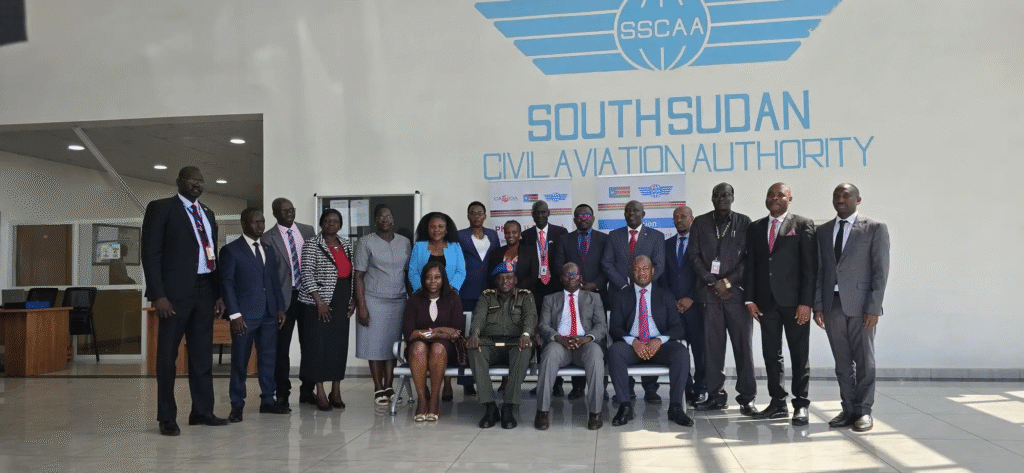
In 2023, South Sudan undertook vital reforms within its Civil Aviation Authority (SSCAA) as part of a broader effort to build a functional and credible aviation regulatory system. These reforms aimed to improve oversight, enhance compliance with international standards, and address persistent challenges in safety and governance. As one of the youngest nations globally, South Sudan’s civil aviation system has faced significant capacity gaps. This article outlines the transformation of the SSCAA, highlights the core policy changes introduced in 2023, and analyzes their impact on the country’s aviation sector and its integration into regional frameworks.
Since gaining independence in 2011, South Sudan has faced considerable obstacles in establishing a coherent aviation regulatory framework. Years of conflict, limited infrastructure, and underinvestment in human capital left the country with a fragile oversight regime. Basic functions such as aircraft registration, air operator certification, and airworthiness monitoring were inconsistently applied, raising serious concerns over aviation safety and compliance.
Moreover, South Sudan’s lack of a centralized aviation database and qualified inspectors further strained regulatory functions. In response to repeated concerns from the International Civil Aviation Organization (ICAO) and regional bodies like the East African Community (EAC) and African Civil Aviation Commission (AFCAC), the government launched a reform initiative in early 2023.
Supported by development partners including ICAO, the World Bank, and the African Development Bank, the initiative focused on strengthening institutional capacity, modernizing regulations, and building stakeholder trust in the SSCAA.
Policy/Regulation Details
The 2023 reforms introduced several institutional, technical, and legal improvements:
- Reorganization of the SSCAA: A new organizational structure was adopted, separating regulatory functions from service delivery. Independent directorates for safety oversight, air navigation, airport certification, and licensing were established.
- Legislative Overhaul: The Civil Aviation Act was amended to clarify the SSCAA’s authority, responsibilities, and enforcement powers. Provisions were added for administrative penalties, compliance inspections, and appeals mechanisms.
- Inspector Training and Certification: A program to recruit and train technical inspectors in airworthiness, flight operations, and licensing was launched in partnership with ICAO and the African Civil Aviation Training Organization (AFCATO). By mid-2023, over 25 inspectors had completed certification.
- Creation of a Digital Civil Aviation Registry: A centralized database for aircraft registration, personnel licenses, and operator certifications was developed, enhancing transparency and information management.
- Standardization of Operator Certification: All existing Air Operator Certificate (AOC) holders were required to undergo revalidation under the updated framework. New entrants faced clearly defined requirements for safety manuals, management structures, and operational procedures.
- Stakeholder Engagement Framework: The SSCAA launched quarterly forums with airlines, airport authorities, and aviation professionals to receive feedback, address compliance gaps, and build public confidence.
While the policy package primarily focused on oversight reform, it also emphasized the importance of aligning with ICAO SARPs (Standards and Recommended Practices) and harmonizing with EAC regulatory frameworks to facilitate eventual integration into regional airspace management systems.

Impact and Challenges
The 2023 reforms signaled a new phase in South Sudan’s aviation sector. For the first time, operators and international partners reported improved communication and transparency from the SSCAA. The structured re-certification process raised the bar for air operators, with several being required to improve documentation and training to maintain licenses.Additionally, foreign technical advisors praised the establishment of an electronic registry and the training of inspectors, noting that these steps would significantly reduce regulatory blind spots.
However, challenges persisted. The SSCAA remained heavily reliant on external funding and expertise, raising questions about the sustainability of reforms once donor support ends. Moreover, the sector’s human capital shortage meant that qualified local inspectors, air traffic controllers, and safety auditors remained in short supply.
Another concern was enforcement. While new penalties and inspection protocols were introduced, actual implementation was inconsistent—partly due to logistical constraints in remote airstrips and airports.
Furthermore, legal ambiguities in coordination between the SSCAA and other government agencies, such as immigration and customs, continued to delay decision-making on flight approvals and operational clearances.
Conclusion
South Sudan’s 2023 Civil Aviation Authority reforms marked a critical turning point in rebuilding the country’s aviation oversight infrastructure. By clarifying regulatory authority, investing in training, and digitizing core functions, the SSCAA laid the groundwork for safer and more efficient air transport governance. While full institutional maturity will require years of continued investment, political commitment, and capacity-building, the reforms represent an important foundation for future regional integration and international aviation collaboration. The progress made in 2023 offers a roadmap for sustained development in a challenging but high-potential aviation environment.


